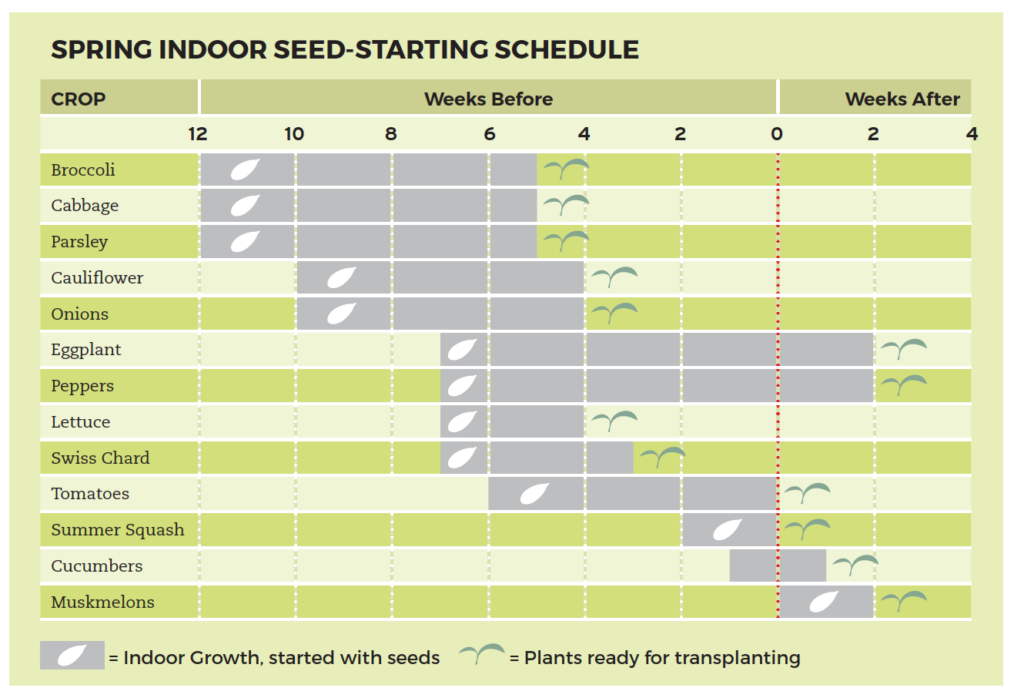It’s time to get your gardening gloves on and get your hands dirty! We’ve compiled a list of planting schedules and calendars for Zone 6 and 8b that will help you plan your vegetable garden for the year ahead.
Zone 6 Planting Schedule
 Zone 6 gardeners are familiar with the challenges that come with fluctuating spring temperatures and unpredictable weather patterns. But with a little planning, you can grow a successful vegetable garden that will provide you with a bountiful harvest all season long.
Zone 6 gardeners are familiar with the challenges that come with fluctuating spring temperatures and unpredictable weather patterns. But with a little planning, you can grow a successful vegetable garden that will provide you with a bountiful harvest all season long.
For Zone 6 gardeners, the growing season typically starts in early to mid-April and lasts until early November. Some vegetables, like peas and lettuce, can be grown in early spring when the soil is cool and damp. Other vegetables, like tomatoes and peppers, need warmer soil temperatures and should be planted later in the season.
If you’re planting a garden for the first time, it can be helpful to start small and choose a few easy-to-grow vegetables, like tomatoes, cucumbers, or beans. As you gain more experience, you can add more challenging vegetables to your garden.
Zone 6 Vegetable Planting Schedule
Here is a list of vegetables that can be grown in Zone 6, along with their recommended planting dates:
- Peas: Late March to early April
- Lettuce: Early April to early May
- Spinach: Early April to early May
- Radishes: Early April to early May
- Carrots: Mid-late May
- Cucumbers: Late May to early June
- Zucchini: Late May to early June
- Green beans: Early June
- Peppers: Early June
- Tomatoes: Mid-late June
It’s important to keep in mind that these dates are just recommendations and can vary depending on the specific characteristics of your garden, like soil type, microclimate, and sun exposure. It’s always a good idea to talk to local gardeners or extension agents to get more specific advice for your area.
Zone 8b Gardening Calendar
 In Zone 8b, the gardening season is longer and offers more opportunities to grow a variety of vegetables and herbs. The climate in this zone is mild, with winter temperatures that rarely fall below freezing and summer temperatures that rarely exceed 100 degrees Fahrenheit.
In Zone 8b, the gardening season is longer and offers more opportunities to grow a variety of vegetables and herbs. The climate in this zone is mild, with winter temperatures that rarely fall below freezing and summer temperatures that rarely exceed 100 degrees Fahrenheit.
For Zone 8b gardeners, the growing season can start as early as mid-January and last until late November. Some vegetables, like broccoli and cauliflower, can be grown as early as January and February. Other vegetables, like tomatoes and peppers, need warmer soil temperatures and should be planted later in the season.
The key to successfully growing vegetables in Zone 8b is to take advantage of the mild temperatures and long growing season. You can grow a variety of vegetables all year long, from spring greens to summer vegetables like tomatoes and peppers, to fall crops like kale and broccoli.
Zone 8b Vegetable Planting Schedule
Here is a list of vegetables that can be grown in Zone 8b, along with their recommended planting dates:
- Broccoli: January to February
- Cabbage: January to February
- Cauliflower: January to February
- Peas: Late February to early March
- Lettuce: Late February to early March
- Spinach: Late February to early March
- Carrots: Late February to early March
- Green beans: Late March to early April
- Tomatoes: Late March to early April
- Cucumbers: Late April to early May
- Zucchini: Late April to early May
- Peppers: Late April to early May
Again, keep in mind that these dates are just recommendations and can vary depending on the specific characteristics of your garden. It’s always a good idea to talk to local gardeners or extension agents to get more specific advice for your area.
Additional Tips for Vegetable Gardening
Whether you’re a seasoned gardener or a first-time vegetable grower, these tips will help you get the most out of your garden:
- Prepare your soil: A healthy garden starts with healthy soil. Before you even think about planting, make sure your soil is rich in nutrients and has good drainage.
- Choose the right location: Most vegetables require at least 6 hours of sunlight per day, so choose a location that gets plenty of sun. You also want to make sure your garden is protected from strong winds.
- Water wisely: Most vegetables need at least one inch of water per week. Water deeply and less frequently to help your plants develop deep roots.
- Mulch: Mulching your garden can help retain moisture, suppress weeds, and regulate soil temperature.
- Fertilize: Vegetables are heavy feeders and require regular fertilization. You can use organic or synthetic fertilizers, just make sure to follow the instructions on the package.
- Monitor for pests and diseases: Keeping an eye on your plants for signs of pests or diseases can help you catch and treat problems early.
- Harvest regularly: Most vegetables will continue to produce as long as you harvest them regularly. Plus, harvesting your vegetables at the peak of ripeness will ensure the best flavor and nutrition.
With a little planning and care, you can grow a successful vegetable garden that will provide you with fresh, healthy produce all season long. Happy gardening!